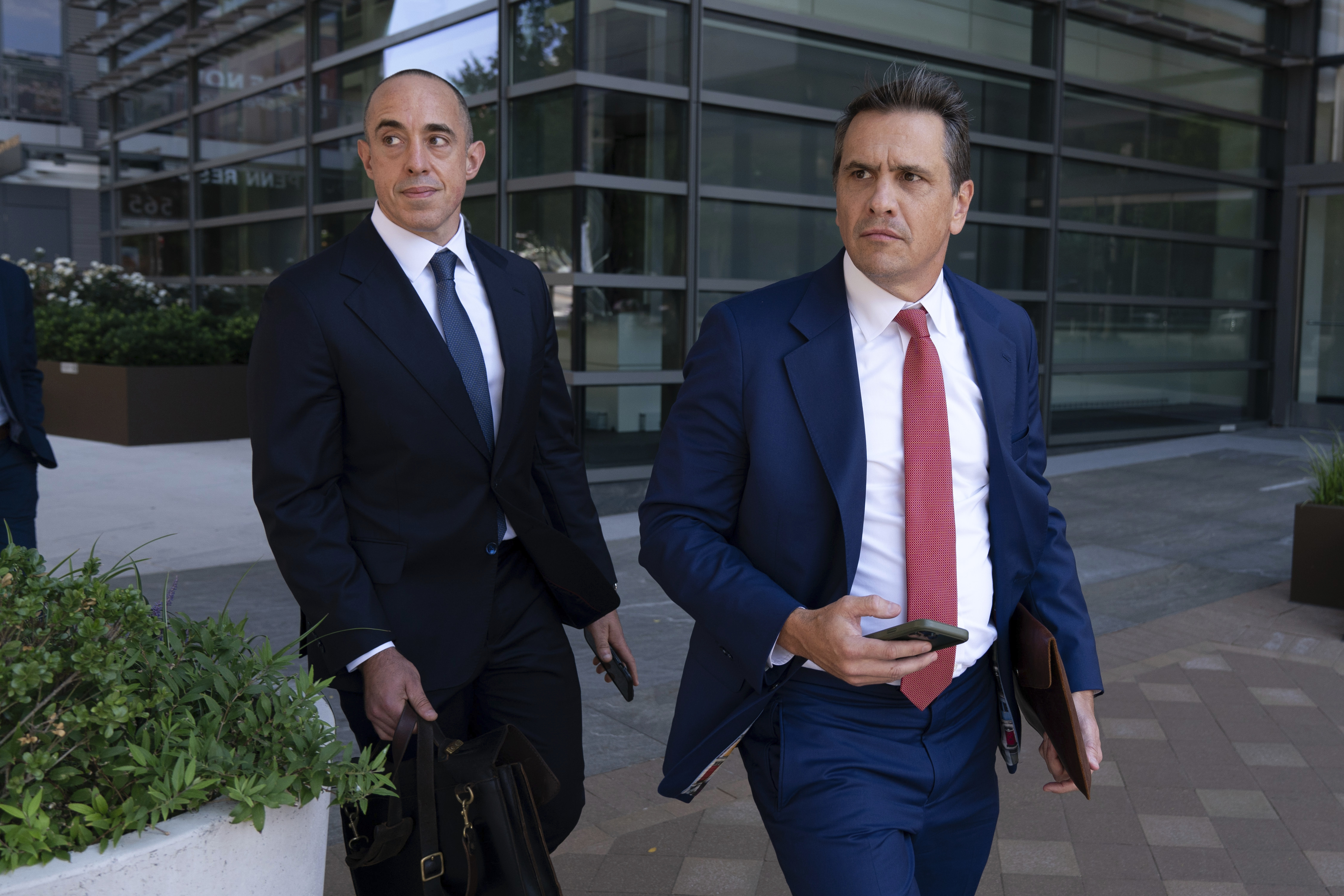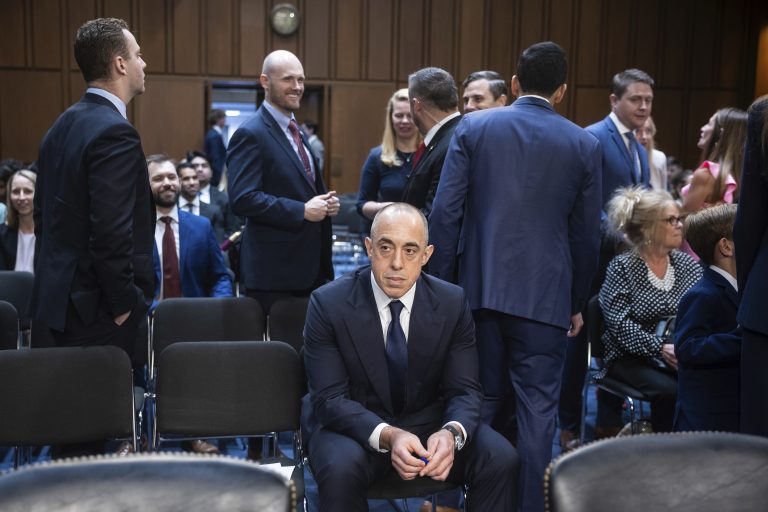President Donald Trump’s first term was marked by a contentious and ultimately wildly successful campaign to overhaul the federal judiciary — one that dominated the Senate floor calendar for nearly four years straight and occasionally exploded in partisan fury.
Now, with Trump dealing with unpredictable foreign crises and a sprawling domestic policy megabill, judge nominations have been almost an afterthought in the White House and on Capitol Hill.
That changed Wednesday, when Emil Bove — Trump’s former personal lawyer, now a top Justice Department official — appeared for the Senate Judiciary Committee for a fiery hearing on his nomination to an appeals court judgeship.
The decision to nominate Bove, and the apparent willingness of Republican senators to fall in line behind him, suggests Trump is embracing a new kind of judicial pick as he continues to face significant resistance to his governing decisions in the federal courts.
Bove, 44, faced intense questioning from panel Democrats who pressed on his loyalty to the president as reflected not only in his private representation of Trump but his actions as principal associate deputy attorney general. Those include dismissing prosecutors tied to cases involving the Jan. 6 Capitol riot, ending the corruption prosecution of New York City Mayor Eric Adams and pursuing the administration’s deportation agenda.
“Bove has led the effort to weaponize the Department of Justice against the president’s enemies,” said Illinois Sen. Dick Durbin, the top Judiciary Democrat. “Having earned his stripes as a loyalist to this president, he’s been rewarded with a lifetime nomination.”
The tenor of Wednesday’s hearing suggested that there is no detente in sight in the escalating partisan fight over federal judges, which reached a crescendo in 2018 with the searing confirmation battle over Supreme Court Justice Brett Kavanaugh.
The only check on the rancor might be the fact that there are relatively few judicial vacancies for Trump to fill at the moment. According to the U.S. court system, there are just about 50 across the country, the vast majority of which are on district courts. The president’s first slate of judicial nominees, including a pick for the 6th Circuit Court of Appeals, is poised to have a vote Thursday before the Judiciary Committee.

There are, however, three Republican-appointed Supreme Court justices 70 or over who are considered possible candidates for retirement over the next three-and-a-half years. Trump’s willingness to nominate Bove — and to weather a hardball confirmation fight when a lesser-known nominee might have had an easier time — suggests he won’t hesitate to tap another loyalist when a high-court slot opens up.
With a potential lifetime appointment to the 3rd Circuit, with jurisdiction over appeals from New Jersey, Pennsylvania, Delaware, and the Virgin Islands, Bove himself could emerge as a SCOTUS short-list candidate if confirmed.
The questioning Wednesday appeared to underscore the high stakes. Democrats questioned Bove about the pardons of Jan. 6 convicts and his role in the removal of the line prosecutors who sent them to jail.
The issue was effective in sinking one prior Trump nominee: his initial pick for U.S. attorney for the District of Columbia, Ed Martin. Sen. Thom Tillis (R-N.C.), a Judiciary member up for next year, effectively tanked his chances by objecting to Martin’s comments minimizing the Capitol riot. (Tillis said Wednesday he has not yet taken a position on Bove’s nomination. “Honestly I haven’t discussed it with my staff yet,” he said.)
Democrats also seized on the Justice Department’s decision to abandon the Adams prosecution — a controversial order from Bove himself that triggered the resignation of at least 6 prosecutors in New York and Washington. In her resignation letter, then-acting Manhattan U.S. attorney Danielle Sassoon accused Bove of engaging in a corrupt deal to drop the case in exchange for the Democratic mayor’s support of Trump’s immigration policies.
Asked during the hearing to swear to his “higher being” that he didn’t make a “political deal” with Adams, Bove replied: “I swear to my higher being and on every bone in my body.”
But Bove also said that he ordered the case dismissed based on “policy considerations,” explaining that “the prosecution placed an inordinate burden on the mayor’s ability to protect the city and to campaign in an ongoing election cycle.”
Using that logic, Sen. Amy Klobuchar (D-Minn.) said, “there would be two classes of justice – one for people who are in office and one for everyone else.”
Bove also denied allegations from a former DOJ official that he suggested defying court orders for the administration’s deportation agenda.
“I am not anybody’s henchman,” Bove told senators. “I am not an enforcer. I am a lawyer from a small town who never expected to be in an arena like this.”
Republicans rallied to Bove’s defense, with the tone set early in the hearing by Judiciary Chair Chuck Grassley (R-Iowa), who noted that the nominee had seen an “intense opposition campaign” and extolled his credentials as a former prosecutor.
Democrats, on the other hand, cast the fight over Bove’s nomination as one of grave significance for the rule of law, echoing a familiar fight from Trump’s first term. Indeed, federal judges appointed by presidents of both parties have been some of the most effective checks on Trump’s power early in his second term — much to the president’s frustration.
Yet Democrats have little power to stop Trump’s nominees so long as Republican senators stick together. With a 53-vote Senate majority, GOP leaders can lose several votes and still confirm Trump’s picks with Vice President JD Vance as a tie-breaker.

Democrats also lack the benefit of the “blue slip” policy that gives home-state senators effective veto power over court nominees. Republicans abandoned the practice for circuit judges during Trump’s first term, one of the procedural changes in the Senate that allowed the party to confirm hundreds of judicial nominees during those four years. Democrats maintained the practice after they won control of the Senate and Joe Biden won the presidency.
Among those attending Wednesday’s hearing were Attorney General Pam Bondi and Deputy Attorney General Todd Blanche — Bove’s supervisors at the Justice Department. Blanche and Bove worked together as Trump’s criminal defense attorneys, including during last year’s criminal trial that resulted in his conviction on 34 felony counts of business fraud. Bondi defended Trump during his first impeachment trial.
Sen. Richard Blumenthal (D-Conn.) contended that Bondi and Blanche attended for the sole purpose of “whip[ping] the Republicans into shape, to make sure that they toe the line.”
“They were there to send a message to Republicans: We are watching you,” Blumenthal said during a news conference after Bove’s testimony. “They were there to watch members of this committee, the Republicans, whom they expect simply to fall into line.”
Bove wasn’t the only Trump nominee answering questions about his loyalty to the president Wednesday. Edward L. Artau, one of four district court nominees to also appear before Senate Judiciary members, was asked by Blumenthal why he did not recuse himself from a case involving Trump after he began lobbying for a federal judgeship.
POLITICO previously reported that Artau, a state judge, was lobbying for a seat on the federal bench while he sat on a three-judge panel in Trump’s defamation case against the board of the Pulitzer Prizes.
Asked by Blumenthal why he did not recuse himself, Artau maintained that he abided by the relevant judicial conduct rule. He said he did know he was under consideration from the White House at the time he wrote the opinion.
“Had the timing been differently, then I may have handled it differently,” Artau said.
Calen Razor contributed to this report.

